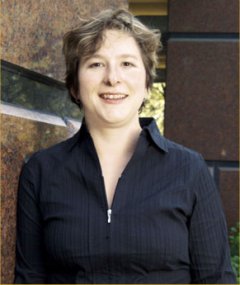Excerpts from the interview:
“Fibromyalgia made me a writer. When you're in your 20s, you just don't think about the kind of energy you spend. Like everybody that age, I assumed I had whatever energy I needed. You go out and party until three, then you spend the next day at the library, then you write your exam.... It's that kind of life, and it took me a lot of years to realize that from that boundless energy that's renewed at every night's sleep, I have a limited store. It's a mysterious syndrome. Nobody really knows what causes it, what the mechanism is. Mine seemed to come out of a couple of bad viral infections: I had mononucleosis, and then right after that I had a bad case of strep throat. It's fatigue that doesn't always seem to have a physical cause -- it comes and goes. When I'm careful about managing it and I'm getting a lot of exercise, or when I'm home and just doing my usual routine, I don't feel like I have a disease. It's a lifestyle: living quietly, and getting lots and lots of rest.
 “People who know me well, and know what it's like for me to be living with fibromyalgia, tell me they see the physicality in my work, because I try to convey my characters' physical experiences. They see that as coming out of my struggle to come to terms with a body that doesn't cooperate. Otherwise, I think how it informs what I do is simply that I have a lot of time, to read and to think and to write. Certainly the collection (like my novel The Burning Girl) is full of alienation and isolation, and that might play into it too. A lot of the stories are about a character who is drawn out of the normal, who starts out in the normal consensual reality and gets drawn away from it, and alienated from it by experience.”
“People who know me well, and know what it's like for me to be living with fibromyalgia, tell me they see the physicality in my work, because I try to convey my characters' physical experiences. They see that as coming out of my struggle to come to terms with a body that doesn't cooperate. Otherwise, I think how it informs what I do is simply that I have a lot of time, to read and to think and to write. Certainly the collection (like my novel The Burning Girl) is full of alienation and isolation, and that might play into it too. A lot of the stories are about a character who is drawn out of the normal, who starts out in the normal consensual reality and gets drawn away from it, and alienated from it by experience.”
*
“I think I'm really drawn to darkness because I try to avoid it like crazy in my real life. Because of the fibromyalgia I've had my family taking care of me, and I'm living in a small town and shutting myself away and learning to write, so it's a very sheltered existence. I've lived a sheltered life in a lot of ways (aside from the occasional adventure). I'm not entirely vanilla pudding, but I have a safe place from which to explore darker things. It's also just about expanding my own experience and finding a kind of courage.
 “That darkness comes out in my writing. I get excited about trying new things. Some pretty grim stuff happens in The Burning Girl, and I had moments of 'Ah! Do I dare do that?' But there's something kind of exciting about daring to shock myself. Dark fiction lets the writer and the reader address moral issues. It's one reason why I don't write the traditional Tolkienesque fantasy of the battle between Good and Evil, because I'm not sure I believe in Good and Evil. I think there are extremes, but it's a spectrum. Dark fiction lets us talk about moral ambiguity and address that assumption, which appears not just in genre fiction; all fiction tends to assume that the moral choice is the default choice, but I think that's not at all true.
“That darkness comes out in my writing. I get excited about trying new things. Some pretty grim stuff happens in The Burning Girl, and I had moments of 'Ah! Do I dare do that?' But there's something kind of exciting about daring to shock myself. Dark fiction lets the writer and the reader address moral issues. It's one reason why I don't write the traditional Tolkienesque fantasy of the battle between Good and Evil, because I'm not sure I believe in Good and Evil. I think there are extremes, but it's a spectrum. Dark fiction lets us talk about moral ambiguity and address that assumption, which appears not just in genre fiction; all fiction tends to assume that the moral choice is the default choice, but I think that's not at all true.
“I did that even more in the book I wrote after The Burning Girl, called Engine's Child, which will come out in early 2008. In some ways it's a more traditional fantasy than The Burning Girl, because it is set wholly in an invented world, though the magic is actually not that different. Engine's Child is all about moral ambiguity -- even the bad guys are trying to do good by their world. It's about three conflicting approaches to solving the major problem in the book, which is ecological and sociological. And nobody gets it right, not even my protagonist. But you do the best you can with what you've got.”



